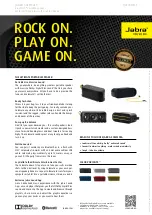
IN
ST
A
LL
A
TI
O
N
G
U
ID
E
page 1 of 2
Rev. A
Overall
Cut-Out (Round x Depth)
PS-601
8-3/8" round
7-3/8" x 2-7/8"
PS-611
8-3/8" round
7-3/8" x 2-7/8"
PS-801
9-3/4" round
8-5/8" x 3-3/8"
SC-520 KE
7-1/2" round
6-1/2" x 2-3/8"
SC-620 KE
8-3/8" round
7-3/8" x 2-7/8"
SC-622 K
8-3/8" round
7-3/8" x 2-7/8"
SC-820 KE
9-3/4" round
8-5/8" x 3-3/8"
SC-822 K
9-3/4" round
8-5/8" x 3-1/2"
AP-601
8-3/8" round
7-3/8" x 2-7/8"
AP-611
8-3/8" round
7-3/8" x 2-7/8"
AP-801
9-3/4" round
8-5/8" x 3-3/8"
SC-502E
7-1/2" round
6-1/2" x 2-3/8"
SC-602E
8-3/8" round
7-3/8" x 2-7/8"
SC-62
8-3/8" round
7-3/8" x 2-7/8"
SC-802E
9-3/4" round
8-5/8" x 2-7/8"
For 5-1/4", 6-1/2" & 8" Round In-Ceiling
For 5-1/4", 6-1/2" & 8" Round In-Ceiling
R
ou
nd
In
-C
ei
lin
g
Lo
ud
sp
ea
ke
rs
Congratulations! You have purchased a high quality stereo
loudspeaker. When matched to comparable electronic
equipment, expect years of quality high fidelity sound. We
are constantly striving to provide the very best technology
has to offer.
The following manual is designed to give you, the installer
or owner, basic information as to the speaker’s installation
and operation. It is beyond the scope of this manual to go
into all the details that must be taken into consideration in
a sophisticated high fidelity system. When installing the
wiring and speakers it is important to adhere to all local
codes and regulations. Consulting a professional will help
to maximize your system’s performance.
If you have any questions regarding this speaker which are
not answered by this manual, contact your local dealer for
assistance. For the most current information please visit
www.oemsystems.com .
GENERAL DESCRIPTION
These two-way speakers have specially designed woofers
with linear long throw butyl rubber surrounds for long life
and superior damping. Dome tweeters are utilized for
excellent high frequency dispersion throughout your entire
listening environment.
SHIPPING DAMAGE
Each speaker is thoroughly tested before it leaves the
factory. However, in shipment, accidents may occur.
Please inspect your speakers carefully when you
receive them to make sure there is no damage. If there
is, please notify your dealer, or supplier immediately
for assistance. If you received your speakers by public
transportation, report the damage at once to the
shipping company.
AMPLIFIER OPERATION
These speakers will perform well with amplifiers from
5 to 125 Watts RMS. However, damage to the speakers
can be done by amplifiers of nearly any power rating
if the amplifier is overdriven into clipping. “Amplifier
clipping” is a phrase used to describe a condition when,
because of the volume demand, an amplifier is being
asked for more power than it can give. Clipping causes
distortion of the audio signal. If you should hear an
unusual amount of distortion at high listening levels
then consider reducing the volume. DAMAGE DONE TO
A SPEAKER BY CLIPPING IS NOT COVERED UNDER THE
WARRANTY.
SPEAKER PLACEMENT
Placement of Ceiling Speakers should be carefully
considered. Please contact a professional for
assistance if you are uncomfortable with the planning
or installation process. Ideally, the speakers should be
located where they will provide the best possible sound
and ease of installation. It is beyond the scope of this
publication to discuss all of the various aspects of speaker
placement. Here are a couple quick suggestions. For more
bass, place the speakers between 18 and 36 inches from an
adjacent wall as measured to the center of the hole. Avoid
placing the speakers less then 18 inches from an adjacent
wall. When placing speakers near a corner, avoid locating
them an equal distance from the two adjacent walls.
Some speaker models are supplied with a cardboard
“Drywall Locator.” If the drywall has not yet been installed,
these locators can be used to reserve the ceiling location.
The hole is cut when the drywall is installed. Simply unfold
the arms and staple each arm to the joists. Use additional
staples through the disk to retain it after adjusting its
position. The cable should be tied off at the hole after
securing it to a nearby joist.
WIRING
To achieve maximum performance from your new speakers
we strongly suggest the use of good quality stereo cable.
There are many good brands available. We recommend
that the cable be at least 16 gauge or larger for runs of
over 50 feet and that the cable be double insulated. This is
often referred to as “jacketed” speaker cable. “Zip cord,”
which is single insulated and is often made with clear
insulation, should be avoided as it is not as durable. Allow
about 2½ feet (0.8m) of free cable at the speaker cut-out




















